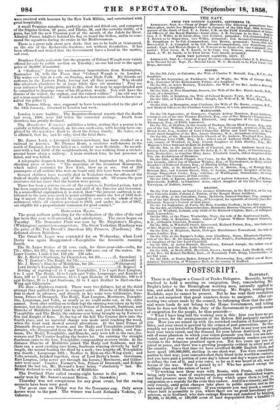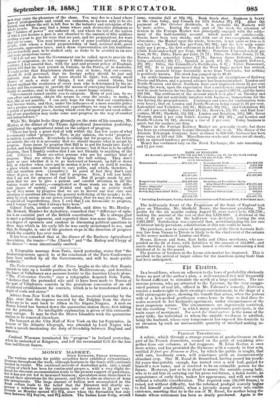POSTSCRIPT.
SATURDAY.
There is at Glasgow a Council of Trades Delegates. Recently, having resolved to hold a meeting on emigration, they, remembering Mr. Bright's letter to the Birmingham working men, naturally applied to him, and asked him to attend their meeting. Mr. Bright, writing from Rochdale, says he cannot be present. But he has read their resolutions and is not surprised that great numbers desire to emigrate. After cor- recting two errors made by the council, by informing them that the colo- nial waste lands do not belong to the Home Governnient, and, telling them he does not think it the duty of the Government to provide means of emigration for the people, he thus priiceedi-
" What I have long told the working men is this : here you have no po- litical power, for the arrangements of the Reform Bill purposely excluded you. Here you are mixed up,with the.,wgetched confusion ofEuropean po- litics, and your sweat is pawned by the crimes of past generations. So tho- roughly are you involved in European implication, that in any year you mg have your taxes' raised, and the demand for your labour destroyed, in pur- suit of some phantom in which your rulers persuade you that you are inte- rested, and your own want of information unfortunately renders you easy victims to the delusions practised upon you. Not five years ago you re- joiced in peace, and there was a growing prosperity evident in every part of the country. Since that time we have sacrificed 40,000 English lives, and have spent 100,000,0001, sterling in one short war. You were consenting parties to that war; your comrades shed their blood inks; worthless contests, and you have paid a portion of your day's labour and day's wages ever since to defray the cost of it, and your voice, so far as it was heard at all, was in favour of the war. What IS gained by it? Who has gained except the military class and the eaters of taxer; ? " To working men these ware with Russia, with Persia, with China, bring only taxes, want of employment, precarious and diminishes! wages, and that pressure upon the means of living which urges them M look to emigration as a remedy for the evils they endure. And it is a remedy, only remedy, until great changes take place in public opinion and in the laws and policy of, this country. If you, emigrate you may.wach a country where land is accessible to you, where there are no greathereclitary prietors, as in Scoiland, who dare outrage Heaven and mankind by keePulk. 20,000, or 50,000, or 100,000 acres of land depopulated that a handful el ,„.,cn may enjoy the pleasures of the chase. You may flee to a land where rows of primogeniture and entail are unknown, or known only to be ab- horred, and where the soil is left free to the industry and enterprise of the
whole ' i people. You may find a home where such destructive delusions as the "Balance of power" are unheard of, and where the toil of the nation i
of which you become a part is not absorbed to the amount of fifty millions sterling a-year to pay for wars that are past, and for preparations for wars that are to come. You may become a part of some youthful and growing people, with whom a feudal proprietorship of land, national debt, great armaments, oppressive taxes, and a sham representation are but traditions of 3 melancholy past, to be studied only as rocks to be avoided in its new and more prosperous career. " If I do not see how the Government can be called upon to provide the means of emigration, do not suppose I think emigration unwise. On the contrary, I feel assured that, with the past and present policy of England, labour will find its best reward in Canada, in the States, or in Australia. I would prefer that Englishmen !should stay at home, that our country should be well governed, that its foreign policy should be just and rational, that its burden of taxes should be light ; but, seeing small chance of such a state of things, I not only cannot blame, but I must applaud the resolution of every man who is determined by his in- dustry and his economy to provide the means of conveying himself and his family to another, and, to him and them, a more happy country, "Government cannot enable you to emigrate. Many of you can, by se- vere effort and saving, obtain the means to cross the ocean ; to many, I fear, this is not possible. I can only hope for them that our countrymen may become wiser, and that, under the influences of a more sensible policy and a greater economy in the national expenditure, we may be entering on a period of prolonged peace, during which even the poorest and most suffer- ing of our population may make some sure progress in the way of comfort and independence.
While Mr. Bright looks thus gloomily on the state of his country, Mr. Henley, at the dinner of the Theme Agricultural Association yesterday, enlightened the agricultural mind on the subject of progress. "There has been a great deal of talk within the last few years of what is commonly called progress.' Now, in my opinion, the word I progress' is entirely a catchword. Everybody is calling out for progress ; but before we endorse the cry it is necessary that we should inquire what is meant by progress. Some mean by progress that Bill is to put his hands into Jack's pocket, and help himself without leave or license ; but if that is to be called progress, then I frankly confess that I am not friendly to anything of the sort. (Cheers.) There are other persons who are for another kind of progress. They are always for keeping the ball rolling. They don't know or care whether it is to go backward or forward, up hill or down hill, or whether when once put in motion it is to roll on until it reaches a place which cannot be named to ears polite, and which, therefore, I will not mention now. (Laughter.) In point of fact they don't care where it goes, so long as they call it progress. Now, I tell you fairly that I am not for progress of that kind. But if people mean by pro- gress that we are to give a patient and careful attention to all the various wants of society,—complicated as those wants are in the diffe- rent phases of society, and divided and split up as society itself is,—if they mean by progress that we are to devote our best care and attention to questions affecting the general well-being of the people; to de- stroy by every means in our power everything that we may see wrong, and to amend all imperfections, then I own that I am favourable to progress, and I venture to say that I always have been."
Colonel North, another county Member, said ditto to Mr. Henley : Kr. Bernard, Member for Aylesbury, remarked that " difference of opin- ion is an essential part of the British constitution." He is always glad to meet a political opponent, and regretted there was none there. There is a degree of openness and candour in discussing political questions in these days which in his early life he was rarely accustomed to see, and that, he thought, is one of the greatest steps in the direction of progress which the country has ever made.
It has been remarked that at the dinner of the Banbury Agricultural Association, the toasts—" the Church " and " the Bishop and Clergy of the diocess "—were intentionally omitted.
A Telegraphic message from Paris, dated yesterday, states that "the finalarrangements agreed to at the conclusion of the Paris Conferences have been ratified by all the Governments, and will be made public forthwith."
The Paris =respondent of the Times laughs at the idea that Russia intends to take up a hostile position in the Mediterranean, and describes the lease of Villafranca as a measure hostile to the Austrian Lloyds alone. "The Piedmontese Gazette," says a telegraphic despatch from Turin, "declares that the pretended sale said to have been made to Russia of the port of Villafranca consists in the gratuitous concession of an old abandoned establishment for convicts, which is to be transformed into a dep6t of coals and stores."
Advises from New York to the 5th instant, received yesterday by the Alps, state that the negroes rescued by the Dolphin from the slaver Echo are to be sent back to Africa in the frigate Niagara. A mob on Staten Island has burned down the quarantine station there, first taking out the patients. No intelligible explanation is given of this extraordi- nary outrage. It may be that the Staten Islanders wish the quarantine station to be removed elsewhere.
The banquet at the City Hall of New York on the 1st September, in honour of the Atlantic telegraph, was attended by Lord Napier who made a speech inculcating the duty of friendship between England and America.
Cardinal Wiseman terminated his "progress" in Ireland yesterday, when he embarked at Kingston, and left the reverential Celt for the less than indifferent Saxon.



























 Previous page
Previous page